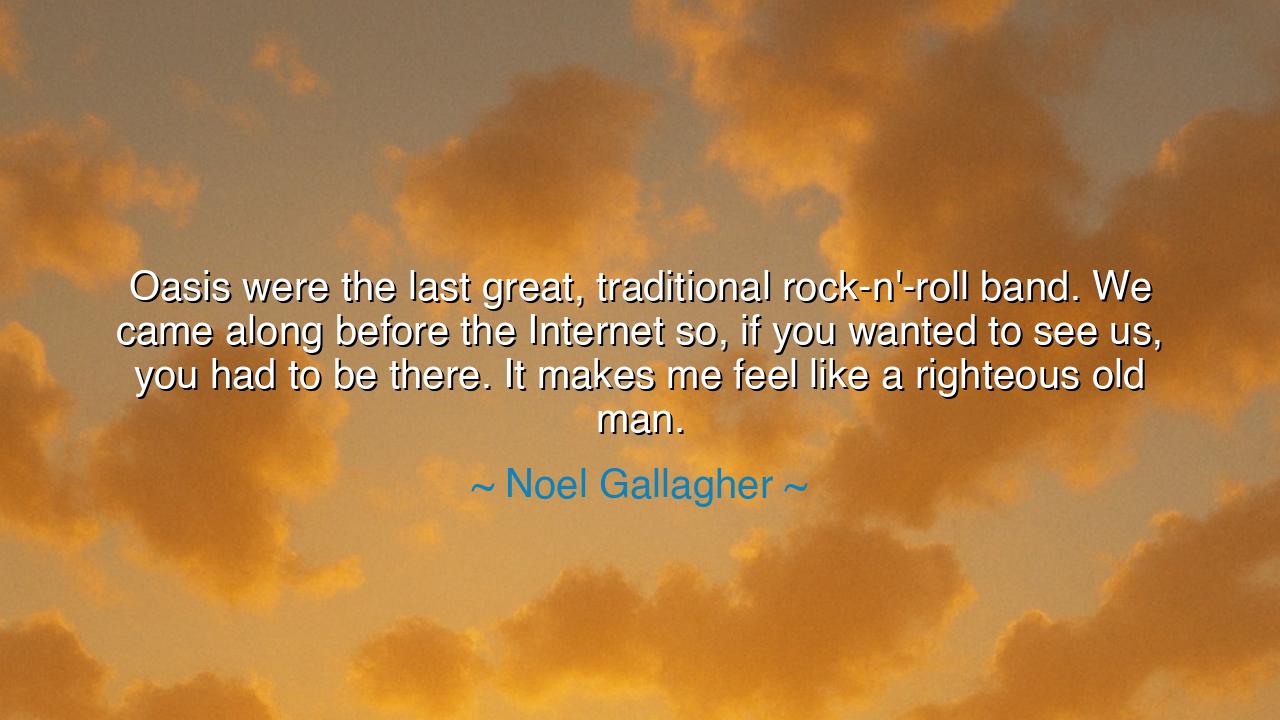
Oasis were the last great, traditional rock-n'-roll band. We came
Oasis were the last great, traditional rock-n'-roll band. We came along before the Internet so, if you wanted to see us, you had to be there. It makes me feel like a righteous old man.






“Oasis were the last great, traditional rock-n’-roll band. We came along before the Internet so, if you wanted to see us, you had to be there. It makes me feel like a righteous old man.” — Noel Gallagher
In these words, Noel Gallagher, the poet and provocateur of Manchester, speaks not merely of music, but of a vanishing age — an era when art was not instant, but lived; when sound was not streamed, but shared in sweat, noise, and communion. His reflection is not nostalgia alone, but reverence for a time when presence was the essence of experience. In saying “you had to be there,” Gallagher mourns and celebrates at once — mourning the loss of the sacred immediacy of art, and celebrating that he lived in the twilight of its golden days.
For in the world before the Internet, to see a band was a pilgrimage. One had to travel, to wait, to stand shoulder-to-shoulder among strangers, bound by the single desire to witness something real. There were no replay buttons, no filters, no distance between artist and audience. The concert was not merely performance; it was ritual, and those who attended were participants in something living. When Gallagher calls himself a “righteous old man,” he does so not in arrogance, but in reverent pride — for he carries the memory of a time when art demanded commitment, when being part of the moment was a sacred act of belonging.
In those years, rock-n’-roll was not just music; it was rebellion in melody, defiance in sound. The great bands of that era — The Beatles, The Rolling Stones, Led Zeppelin, and later Oasis — stood as voices of a generation that sought meaning beyond conformity. To be in the crowd was to stand inside the heartbeat of a movement. Each song was a declaration of identity; each lyric, a battle cry. The stage was a temple, and those who performed upon it carried a kind of mythic power — not of fame alone, but of spirit, of authentic human connection.
The ancients, too, knew this kind of immediacy. The philosophers of Greece spoke in the open air to their disciples, their words alive with the energy of the crowd. The poets of old recited their verses by firelight, and the listeners, gathered close, felt the pulse of each word as it struck their hearts. There was no screen between them, no machine to mediate their communion. Like the concerts Gallagher recalls, those moments were ephemeral — lost the moment they ended, yet eternal in memory. What mattered was not perfection, but presence.
Gallagher’s lament, then, is not a dismissal of progress, but a warning against disconnection. The modern world offers abundance of content but poverty of experience. We are surrounded by sound but starved of silence; we scroll through performances but seldom feel them. The Internet has given us access to everything, yet robbed us of the hunger that once made us seek. To watch a concert online is convenient, but it is not the same as standing in the crowd — feeling the vibration of the bass through your chest, shouting the lyrics with strangers who become kin for an evening. In the digital world, we have gained infinity but lost intimacy.
And yet, Gallagher’s “righteous old man” tone carries not despair, but defiance. It is a challenge to the young — to remember that some things cannot be downloaded or streamed. True art, true life, still requires presence, effort, and faith. If you wish to understand beauty, you must go to where it lives. If you wish to feel alive, you must step into the noise, risk the chaos, and be there. The screen may offer reflection, but the world offers revelation.
So, O listener of this age, take this lesson: do not let the immediacy of life be lost to convenience. Go where the music plays. Stand in the rain to see your heroes. Read poetry aloud to friends, not followers. Let your soul remember what it is to gather, to feel, to witness something that cannot be paused or repeated. For in such moments — raw, fleeting, and real — you will taste the very essence of being human. And when you, too, grow old and look back upon your youth, may you speak, as Gallagher did, not of what you watched, but of what you lived.






AAdministratorAdministrator
Welcome, honored guests. Please leave a comment, we will respond soon